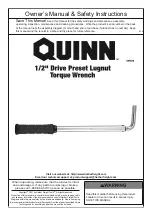
-3-
Maintain tools with care. Keep cutting tools
sharp and clean.
Properly maintained tools,
with sharp cutting edges are less likely to bind
and are easier to control. Any alteration or
modification is a misuse and may result in a
dangerous condition.
Check for misalignment or binding of
moving parts, breakage of parts, and any
other condition that may affect the tools
operation. If damaged, have the tool
serviced before using.
Many accidents are
caused by poorly maintained tools. Develop a
periodic maintenance schedule for your tool.
Use only accessories that are recommended
by the manufacturer for your model.
Access-
ories that may be suitable for one tool, may
become hazardous when used on another tool.
Service
Tool service must be performed only by
qualified repair personnel.
Service or
maintenance performed by unqualified
personnel could result in a risk of injury. For
example: internal wires may be misplaced or
pinched, safety guard return springs may be
improperly mounted.
When servicing a tool, use only identical
replacement parts. Follow instructions in the
Maintenance section of this manual.
Use of
unauthorized parts or failure to follow
Maintenance Instructions may create a risk of
electric shock or injury. Certain cleaning agents
such as gasoline, carbon tetrachloride,
ammonia, etc. may damage plastic parts.
Unplug tool before setting up in table, making
adjustments or changing bits.
Accidental
start-up of the tool can cause injury.
Securely fasten table to a stable platform or
workbench.
During operation unstable
platforms or workbenches may shift or tip
causing loss of control and injury.
Securely fasten tool to table before operating.
If tool loosens during operation it will tend to
ìwalkî down from clamp and tool may fall while
bit is still spinning.
Know how to shut off the tool!
Position the
tool under the table so that switch is readily
accessible to quickly shut off in an emergency.
Route the cord away from the bit or cutting
area.
Cutting into live electrical wires may result
in a shock, burn or electrocution.
Wear eye protection and dust mask. Use
only in well-ventilated area.
Using personal
safety devices and working in safe environment
reduces risk of injury.
Match the appropriate bit and its speed to
your application. Do not use bits that have a
cutting diameter that exceed the capacity of
the tool.
The shaper/router table is intended
primarily for light duty use on wood.
Overloading the tool can lead to personal injury
or tool failure.
Never use dull or damaged bits. Sharp bits
must be handled with care.
Damaged bits can
snap during use. Dull bits require more force to
push the workpiece, possibly causing the bit to
break.
Always make sure the workpiece is free from
nails and other foreign objects.
Cutting into a
nail will damage the bit and can cause the
workpiece to jump causing loss of control.
Use guard in all cutting applications except
for sanding and certain rabbeting operations.
If any portion of the spinning bit is contacted
injury will occur.
Use the adjustable fence in straight cutting
applications.
When routing along an entire
edge of the work the fence and adjustable
support wedge will help maintain stability and
prevent forming concave shape or snipe on the
edge.
Only piloted bits can be used without the
fence. Piloted bits are used when routing
internal and external contours on the
workpiece.
Piloted bits assist in maintaining
control of the workpiece when the fence is not in
use.
Never start the tool when the bit is engaged
in the material.
The bit cutting edge may grab
the material causing loss of control of the
workpiece.
Never place hands near the spinning bit. Use
a push stick or fixture to guide small or thin
workpieces when shaping/routing these
pieces.
Guiding the material with both hands,
push sticks or fixtures is preferred to avoid
contact with the spinning bit.
Feed the workpiece against the rotation of
the bit. The bit rotates counter-clockwise as
viewed from the top of table.
Feeding the
work in the wrong direction will cause the
workpiece to ìclimbî up on the bit and may lead
to loss of control during operation.
After changing the bits or making any
adjustments, make sure the collet nut and
any other adjustment devices are securely
tightened.
Loose adjustment device can
unexpectedly shift, causing loss of control, loose
rotating components will be violently thrown.
Never touch the bit during or immediately
after the use.
Contact with a spinning bit will
cause injury and after use the bit is too hot to be
touched by bare hands.
Safety Rules for Router/Shaper Tables
DM 2615302562 9/00 9/21/00 9:20 AM Page 3
Содержание 5000231
Страница 8: ... 20 MODEL MODÈLE MODELO 5000231 ...



























